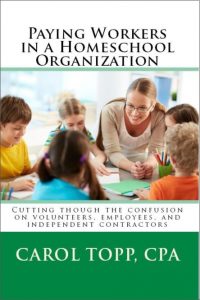
Hi Carol,
I am a part of a Classical Conversations community with a Foundations/Essentials director. The Foundations/Essentials directors hire tutors to run the classrooms on community day.I am concerned that the tutors are being treated as employees even though they are paid as independent contractors. Can a Foundations director hire tutors as independent contractors and still be able to specify what time they start, what material to cover and for how long they are to cover it, require training in the summer and training every 6 weeks of class etc?
Would a contract help? It seems like the contract could call the tutor an independent contractor but the Director could still treat them like employees.
This is hugely concerning and our campus wants to operate in a legal way. We are considering hiring a lawyer to help us understand all this. Is the lawyer the way to go? Or would you be able to advise on how to handle this?
We want to be legal and try to sort out truth in this whole legal situation.
Thank you for your time,
Katherine
Katherine,
Thank you for contacting me. I have been talking to several Classical Conversation (CC) Directors and tutors about worker classification. It’s a confusing and complex topic!
Factors: control and key activity
The question of whether CC tutors are independent contractors (IC) or employees involves many factors to consider including some you mentioned such as training, specific time and place to work, the curriculum to use, etc. But you are majoring in the minors and neglecting the overarching issues.
Two overarching factors to consider are:
- the amount of control the Director exerts (or has the right to exert) over the worker
- if the tutors are providing the key activity of the business.
By the way, these factors of control and providing a key activity apply to all types of homeschool groups, not just Classical Conversations.
Some homeschool organizations may depend heavily on the tutors’ services as the key activity of the business, while other homeschool groups may not use tutors as the key activity because they rely on volunteer parents to teach their classes.
My conclusion: CC tutors are employees
In my professional opinion as a CPA qualified and licensed to practice before the IRS and after much research and interviews with CC Directors, I conclude that CC tutors provide the key activity of the business and the Director has the right to exert control over the tutor, making them employees.
Would a contract help?
You asked, “Would a contract help? It seems like the contract could call the tutor an independent contractor but the Director could still treat them like employees.”
You’ve hit the nail on the heard. Having a contract is not assurance that a tutor is an independent contractor; how they are treated carries more weight in determining proper worker classification.

My book Paying Workers in a Homeschool Organization will help. It explains both the current criteria the IRS uses and the criteria they have used in the past to determine independent contractor or employee status.
You could, of course, convert all your tutors to employees, and sleep better at night! One of HomeschoolCPA’s Recommended Homeschool Consultants can explain the steps you’ll need to take. It will be more paperwork and more expense, but you won’t worry about an IRS investigation on worker status.
Carol Topp, CPA
HomeschoolCPA.com
Carol Topp, CPA
HomeschoolCPA.com

If the tutor was re-categorized as an employee, would minimum wage then apply? And would it apply to prep time at home + time at the community day (including time to set-up room/write board/clean up) + the required annual training AND four required tutor meetings?
Yes minimum wage laws apply .
Typically the teaching day (what you call community day), and all required training hours are to be paid to the employee. The prep time may or may not be paid by the employer. I’m not an employment expert, so I cannot answer that part of your question accurately.
I do know that frequently schools allow teacher an allotment of time during the school day for planning, grading, etc. I think it would be reasonable (and appreciated by the employee) for the employer to allot a set amount of time each week for planning and pay the teacher for that time.
Carol Topp, CPA
I do not have a financial background, but what evidence would the IRS use to prove the “employee” was “treated” wrong? If it’s how much freedom the tutor ‘felt’ they had I am still confused. Also if I hire a independent contractor to paint my walls do I not have full rights to specify how, what color, the time frame I need it done, ect? How can this trally be an issued PROVED by IRS?
I’ve written several blog posts on the factors (what you call “evidence”) that the IRS considers in making a worker determination. Here’s one: https://homeschoolcpa.com/definition-of-independent-contractor-behavior/
Behavioral Control is only one of the many factors to be considered.
The IRS says, “Businesses must weigh all these factors when determining whether a worker is an employee or independent contractor. Some factors may indicate that the worker is an employee, while other factors indicate that the worker is an independent contractor. There is no “magic” or set number of factors that “makes” the worker an employee or an independent contractor, and no one factor stands alone in making this determination. Also, factors which are relevant in one situation may not be relevant in another.”
So citing an IC painting your walls is not relevant in determining worker status of a teacher in a homeschool or Classical Conversations group. They are very different situations. A better comparison is an adjunct instructor at a local college. The IRS has several rulings about the worker status of college instructors.
The IRS does not use the word “prove” as used in science. Instead they make judgements or determinations, like a judge. Application of IRS regulations and determinations is not science, it’s *law* and that’s a different mindset. Things cannot be “proven” in law like they can in science.